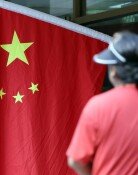Giving up THAAD for Chinese pressure will lead to collapse of KOR-US alliance
Giving up THAAD for Chinese pressure will lead to collapse of KOR-US alliance
Posted August. 05, 2016 07:56,
Updated August. 05, 2016 08:01
On North Korea’s firing of ballistic missiles on Wednesday, the Chinese foreign ministry said, “All parties should refrain from taking acts that could escalate tension or provoke each other in the region.” The fact China is urging ‘all parties concerned’ to refrain in the wake of Kim Jong Un’s provocation, which the whole world is fully aware of, makes us deeply wonder which values the world’s most populous country is pursuing. For the same reason, we can hardly understand criticism by China's official People’s Daily, by naming her name against the South Korean president, who inevitably decided to deploy the terminal high-altitude area defense (THAAD) to counter the North’s successive nuclear and missile tests as part of this country’s right to national security.
“Korea’s policy-decision maker caused damage to security interests of a large neighboring country by disregarding destabilizing (of peace) within the region by unilaterally linking (her) country’s security with the U.S. THAAD system,” the daily's editorial on Wednesday said. “President Park Geun-hye’s approval rating was shown to have plunged in the fourth week of July,” in mentioning the name of the South Korean head of state. The Chinese newspaper represents the official stance of the Chinese People’s Party. “If armed conflict erupts, South Korea will become the primary target of attacks,” the newspaper added, revealing its anachronistic understanding (of China) as (South Korea’s) master country and effectively reminding us of declaration of war. The Chinese daily called in its Monday editorial South Korea "U.S. informant," saying that Korea’s policy-decision maker should maintain basic sense of alertness and reality, which naturally makes most South Koreans feel humiliated.
China’s passive act against North Korea’s nuclear weapons and missiles that pose threat to world peace, but blaming the defense system of THAAD on the contrary is an act that is hardly compatible with its scale as a "gigantic country." China only uses THAAD as an excuse, and Beijing’s real intention is to weaken the South Korea-U.S. alliance by splitting off South Korea, which maintains the weakest link in the three-way security cooperation between South Korea, the U.S. and Japan. Beijing’s threat “The best way for South Korea to ensure its safety is only maintaining amicable relations with a neighboring country’ constitutes its demand for Seoul to side with Beijing. If the South withdraws THAAD deployment plans due to economic concerns, China will judge that it can easily sway the South Korea-U.S. alliance with money as it pleases, and could make additional demands that may be more difficult for Seoul to accept, such as withdrawal of the U.S. Forces Korea next time.
China has already made it more difficult for South Koreans to receive multiple-visit commercial visa and started imposing restrictions to South Korean entertainers’ appearance on Chinese concerts and TV shows. The fact the South Korean foreign ministry commented on this by saying “There were no central government guidelines, and restrictions have been made at the discretion of provincial governments or private companies,” sounds as if Seoul has no will even to counter Beijing’s unjustifiable act. The fact the foreign ministry only commented “It is regrettable that (China) is making unilateral claim” only about Beijing’s urging all parties’ to refrain also clearly reveals the ministry’s excessive mindfulness of Beijing. China will have no reason to respect diplomacy of South Korea if Seoul simply follows Beijing’s stance.
China is a country that accounts for one fourth of South Korea’s export, but South Korea itself is China’s fourth largest export market. If China takes economic retaliation against South Korea, China also has to suffer damage, which means bilateral economic relations are reciprocally dependent upon each other. If China intends to control South Korea, Beijing should be aware that it also stands to lose dearly.
The South Korea-U.S. alliance represents strong bilateral commitment that the two nations will share each other’s fate. The U.S. is the only country in the world that is ready to shed blood for South Korea, if the North invades into the South again. Withdrawing the decision to deploy THAAD is no different from a move to end the South Korea-U.S. alliance, and become China’s subordinate country all over again. This is obviously shown in the People’s Daily. Will China shed even a single drop of blood for South Korea?
한기흥기자 eligius@donga.com





![먼지인 줄 알았더니…서랍 구석 ‘해충 배설물’ 습격 [알쓸톡]](https://dimg.donga.com/c/138/175/90/1/wps/NEWS/IMAGE/2025/12/19/133001422.3.png)
![“아무리 씻어도 안 빠져” 김치통 냄새, □□으로 싹 [알쓸톡]](https://dimg.donga.com/c/138/175/90/1/wps/NEWS/IMAGE/2025/12/18/132993861.3.jpg)
